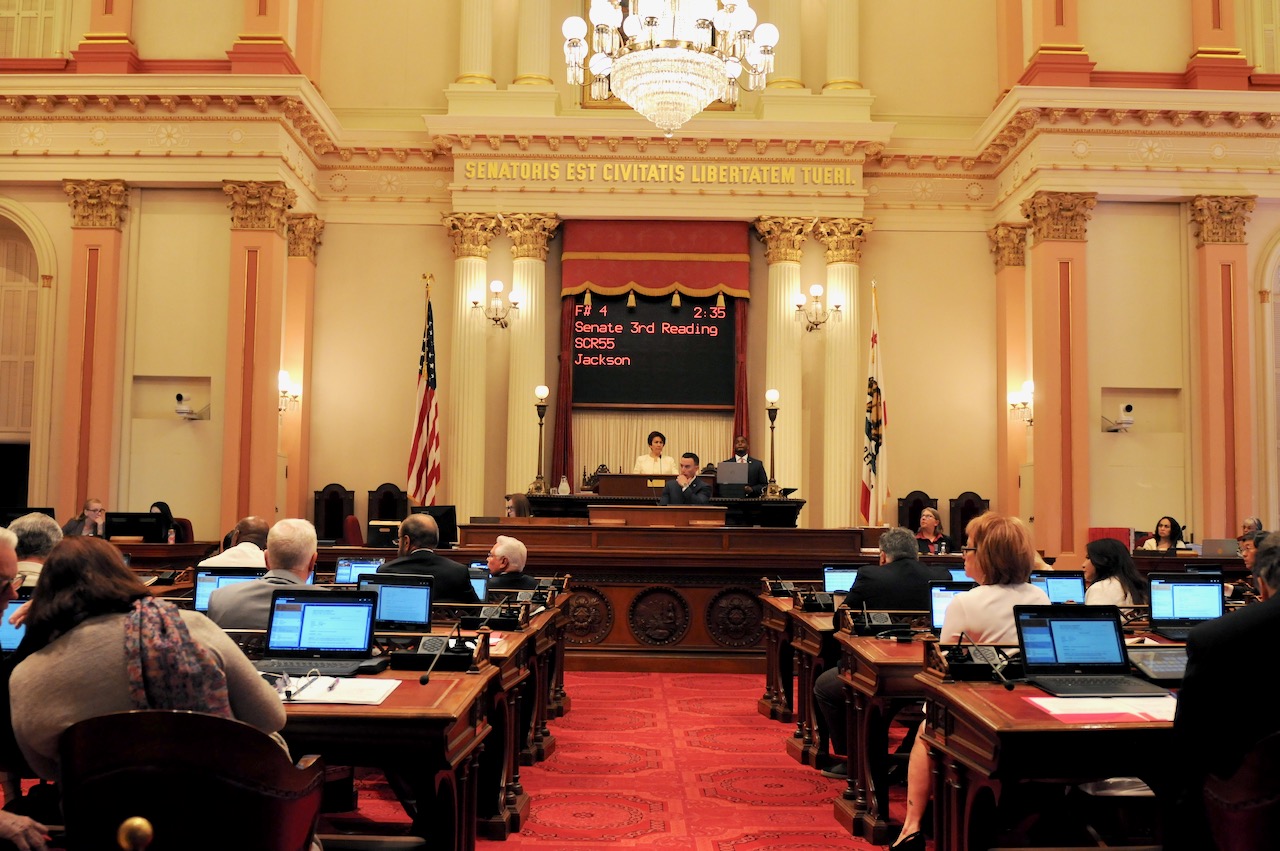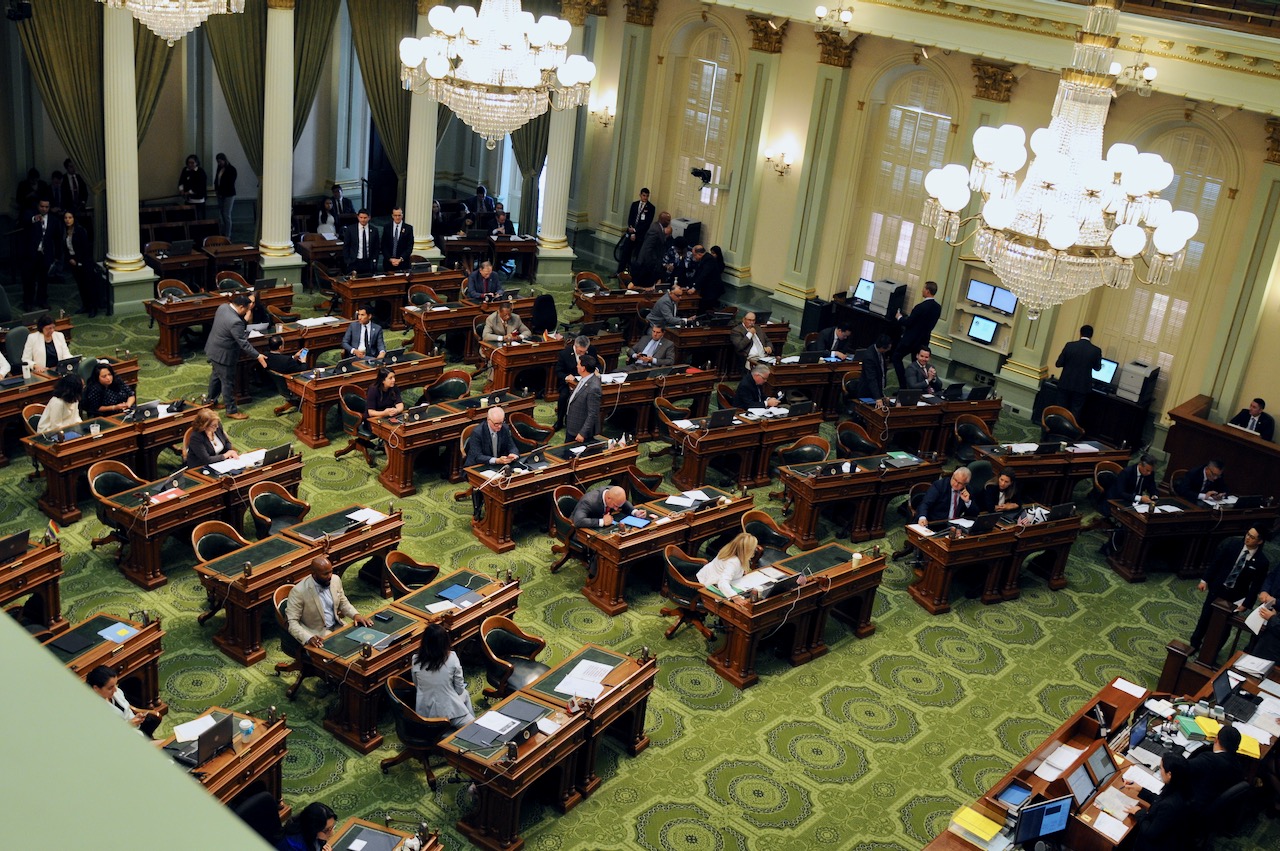
California Air Resources Board. (Photo: CARB)
California Trucking Assoc. Sues CARB Over Advanced Clean Fleet Regulations
The first new ACF regulations had been expected to begin in the next few weeks
By Evan Symon, October 19, 2023 2:30 am
The California Trucking Association (CTA), the state’s largest trucking trade association, filed a lawsuit against the California Air Resources Board (CARB) earlier this week over soon to be enacted Advanced Clean Fleet regulations.
The controversy over the CARB deal dates back to April. That month, CARB announced that the sale of all new diesel big rig trucks and buses will be banned in the state of California starting in 2036, similar to the state’s new gas-powered car sale ban that is currently set for 2035. In addition to the 2036 sales ban on new diesel trucks and buses, CARB also announced that all trucks in California must be zero-emissions by 2042. Under these new regulations, also known as the Advanced Clean Fleets rule, CARB aimed to achieve a total zero-emissions truck and bus fleet by 2045, as well as have at least 1.6 million zero-emission medium- and heavy-duty trucks operating in the state by 2048.
In July, a new agreement between CARB and and a large coalition of truck makers, the Truck and Engine Manufacturers Association (EMA), was formed. Known as the Clean Truck Partnership, the agreement is formally between CARB and truck makers including Cummins, Daimler, Ford, GM, Hino Motors, Navistar, Stellantis, and Volvo, along with several others in the EMA. In addition to the agreement on meeting California’s new zero-emissions law by 2036 in California, CARB will commit to meeting less-stringent new EPA regulations on nitrous oxide emissions and give a buffer of four years of lead time and three years of regulatory stability while transitioning into the new CARB emission laws.
However, trucking associations were up in arms over the deals, raising concerns about shipping delays, battery recharge times, and most critically, the federal Environmental Protection Agency (EPA) not signing off on them and the whole agreement violating the Federal Aviation Administration Authorization Act (F4A). With the first Advanced Clean Fleet regulations set to come into effect in the coming weeks, the CTA sued CARB earlier this week.
According to the California Truck Association v. California Air Resources Board suit, the new regulations never received a waiver from the EPA, which is needed because of the California regulations being more strict than federal regulations. The CTA cites some precedent on the matter as well, with previous similar legislation getting that waiver. In addition, the CTA also says that F4A is being violated because of a state (i.e. California) passing new regulations that impacts a “price, route or service” given by a trucking company.
The suit also asks the U.S. District Court to declare the regulations invalid and to have CARB stopped from enforcing said regulations.
“A state can implement its own requirements on the sale of vehicles in its borders, but only when those mandates strictly comply with federal requirement,” said the CTA in their suit. “In no form has the legislature granted to CARB, or Congress granted to EPA, the authority to adopt a regulation with such sweeping power over the California economy and by virtue of the interstate nature of California’s trucking industry, the national economy.”
CTA sues CARB
CTA CEO Eric Sauer added on Tuesday that “Litigation was not our desired path concerning the industry’s transition to zero emissions, but conflict was inevitable once it became clear that CARB embraced a make-believe view of what could be accomplished with today’s technology and infrastructure. In doing so, the agency violated multiple state and federal laws and, accordingly, these issues will be brought before the courts by CTA and multiple other entities.”
While CARB has yet to respond to the lawsuit, experts noted on Wednesday to the Globe that the suit has a decent chance in court.
“Electric vehicles are obviously the future, and yeah, overtime as technology gets better, more and more will be on the road,” said Simon Bernard, a trucking advocate who works with many trucking and shipping companies on logistics and fleet issues. “But putting in a cut-off date before where we know technology will be is not great. Trucking companies stand to lose a lot, especially if the state goes hardball with the regulations and forces companies to no longer use perfectly good trucks.
“But, as the suit says, CARB’s regulation clearly is breaking federal regulations right now, and federal law. If CARB had worked with the trade group instead of just manufacturers to get more flexible dates and guidelines, then we might not be in this mess. But as it stands, CARB is breaking the law and threatening the financial future of many trucking companies, right at the time when we need them more than ever. It’s not a surprise they sued. It has been expected for months.”
More on the suit is expected to come out in the coming weeks.
- San Diego Country Supervisor Jim Desmond Calls San Diego New Epicenter Of Illegal Crossings By Migrants - April 27, 2024
- Oracle Moving Headquarters Out Of Austin Only 4 Years After Moving Out Of California - April 26, 2024
- Congressman Adam Schiff Robbed of his Luggage in San Francisco Car Break In - April 26, 2024





Stop the petro oil gas diesel detractors NOW! Hydrocarbon fuels are you friend and passport to mobility. Batteries will never satisfy our power needs: Nor will they suffice here:
https://highseascruising.com/icon-of-the-seas/
The largest cruise ship in the world powered by hydrocarbon fuel and diesel; no batteries here.
Get this before a real judge (if there is such a thing) and the whole scam goes away because CARB faked the “science” behind their attack on diesel. Remember the fake PhD who published the fake report justifying their attack on transportation?
In Senior Leadership of a major trucking company I was involved in decision making as these policies were promulgated by the CARB group. Thousands of small business truckers were put out of business within a very short period of time (without an idiotic small engine fix which was not affordable or sensible). What the engine changes came from the legal changes was using an additive called DEF that actually made the exhaust cleaner than what the engine actually sucked into the engine. The new rules the state have come up with are unnecessary and could in reality down the road create an incredibly costly cross dock industry on the borders of the state where most truckers would not be able to cross state borders. This is what happens when 90% of elected officials are both like minded and frankly ignorant.